- Home
- Jane Smiley
Taking the Reins (An Ellen & Ned Book) Page 7
Taking the Reins (An Ellen & Ned Book) Read online
Page 7
Da wasn’t saying anything, either. He brought Mordecai to the barn, untacked him, washed him a little where he was sweaty from the saddle, then walked him out of the barn to the turnout and came back with LB. He put him in the cross-ties and started currying him. Abby went back to the hay barn. I said, “You’re all business today.”
Da shrugged.
“What’s the matter? Are they locking you in your room at night?” Actually, I did not want this bit of imagination to turn out to be true.
“No, as if that would work anyway. I’m sad that I’m so stupid.”
“What are you talking about?”
“The reading thing. I realized after we talked about it that Mom didn’t hold me back because I was young, she held me back because my teacher in kindergarten told her to. Her name was Miss Livingston. I had to do kindergarten twice, and then I was terrible in first grade. Maybe I wasn’t joking when I said that I can’t read. I found that book of yours, and I tried the first two chapters, and they didn’t make any sense at all.”
“You must have never known anyone with a pet pig.”
“I did, though. A friend of my mom’s. He had it for four years and it got to be eight hundred pounds.”
“Was it as big as a pony?”
“Shorter but wider. The kids would ride it around the yard. They called him Spiffy. They brushed him like a horse, and he liked it. Pigs aren’t dirty like in that book.”
I didn’t know what to say. We finished tacking up and led the ponies out of the barn. I took Tater to the mounting block and Da mounted LB from the ground, though he didn’t throw himself up. Abby was now in the house, so we ambled into the arena and walked around on a loose rein. Da started talking again. “Do you have anything else you could read to me?”
“Do you know about Sherlock Holmes?”
“My mom likes those movies. There’s one that comes on the late movie sometimes called The Hound of the Baskervilles. She always says that if she’d had the chance, she could have trained that dog. They just didn’t use the right techniques.”
“Well, the movies started out as stories. I have one of those books at home, and can read you a couple.”
“When?”
“Tomorrow.”
We picked up the trot just as Abby came into the arena and closed the gate. Now it was my turn to learn. I went up to Abby and said, “I want to do everything that Da does. I want to observe him”—I emphasized the word “observe”—“and then imitate him.”
“You always make me laugh.”
Da came around the triple that was in the center of the arena. I turned Tater and trotted after him. And I truly hoped that Da would not get LB to rear up so that he could slide off his back end. That was something I did not want to imitate.
I guess Abby had decided that there should be those leg yields, and Da was good at that. After we were warmed up, I watched Da do four leg yields at the walk, two in each direction, then I did my best, but Tater pretended not to know anything about leg yields, so the next thing I did was ride Tater right behind LB and watch what Da did with his legs, his hands, and his seat. What he did was put the outside leg behind the girth and the inside leg on the girth, open his inside rein a little, and shift his seat to the outside. Then he urged LB by prodding him with his heels, and pretty soon, LB was crossing his outside hind leg in front of his inside hind leg and moving along the rail even though he was not turned toward the rail. I tried it again, doing what Da had been doing, and it worked—Tater moved along the rail and I could feel his hind legs crossing. We did it a few more times at the walk, and then at the trot. The interesting thing was that Tater perked up while we were doing it, and moved along very nicely. Then we did it on a circle, out and in, out and in, both directions. Now they were warmed up, so we cantered around the arena a few times while Abby lowered the triple, and then we did the jumping part.
There are pairs classes in some horse shows—my favorite is pairs abreast, where the riders wear all their fanciest clothes, and the two horses, who look like one another, go around the course together. The winners are the ones who seem glued to each other, and who do not switch their tails and pin their ears the whole time, because the horses have to like one another. Da and I did our jumping like the other kind of pairs class, where one horse follows the other one about four lengths behind, and then the first horse drops back and the second horse goes in front. We did it twice, and I started out behind. It was a good way to see Da’s balance close up, to see how he rose and went forward as LB began to jump the fence, just as easy as you please, the way a branch might lift in a breeze—the most normal thing in the world. When he slowed down and it was my turn to take the lead, I went around him to the right and I did that thing I do so well, which is to think of two things at the same time—the jump coming up and the sight of Da rising to meet the jump. Then Abby let us do pairs abreast over the two oxers on the long side. Tater is bigger than LB, so I had to sit up a little to get him to slow down, and Da had to push a little to get LB to lengthen his stride. The first time, Tater was in front by a head, and the second time, going the other direction, LB was a little in front, let’s say half a head, but the third time, Tater was light as a feather, and we seemed exactly together. Afterward, Abby said that over both oxers, their front knees rose and bent at exactly the same time, and even their ears were pricked in the same way. Then she told us about going to a show a few years ago where there was a pairs abreast class, and the horses that won looked exactly alike except that one had a white left foot and the other had a white right foot, no other markings, and the riders held each other’s reins—and the rider on the left held both left reins and the rider on the right held both right reins—and the riders’ legs were almost touching.
I said, “Was that the Goldman twins?”
“No, but they were there, and they wanted to do it. It looked dangerous to me, but nothing looks dangerous to them.”
“Do they still take lessons?”
“They did last summer, but this summer, they’re in France, studying French. That friend of theirs from France talked them into it.”
I said, “I’m surprised she had to.”
Abby said, “My guess is, she mentioned it, and they bought the tickets.” Then, “You know, they also have hunt teams, where three horses jump abreast.”
Da said, “My mom and Aunt Jane used to do that with a friend of theirs.”
I said, “Am I surprised? They’ve done everything.”
Da said, “When you’re foxhunting, lots of people go over the fence at the same time, or almost the same time, especially the whippers-in.”
I said, “What—”
Da said, “Those are the ones who make sure that the hounds stay together, but they have to be in front so that the hounds don’t run away from them.”
I said, “Do you like foxhunting?”
“I like drag hunting, but I don’t like the hounds killing the fox. Mom says, ‘Well then, why are you not a vegetarian?’ and I say, ‘Because you would starve me to death if I were,’ and so we don’t talk about it.”
I said, “Let’s have one last little canter.” I turned, went to the rail, and rose into a very nice canter on Tater’s not-so-good lead, his right, and Da was close behind me. Then I circled a jump, and got behind him, and he went on, around and around, across the diagonal—Da, flying change; me, simple change—and then around to the left. And then it was hot, so the ponies were sweaty, and we walked up the hill and back down to cool them out.
I could see Ned in the pasture, all by himself. Gee Whiz and Beebop were eating the last of their hay together, and so were two of the boarders who I didn’t know. When those two trotted toward Ned, he spun around and trotted away. I said to Tater, “Are you Ned’s friend?” And Tater tossed his head toward LB as if to say, “My friend is right here.”
On the
way home, I asked Mom what a vegetarian was, and she told me that it was a person who didn’t eat meat, though they might eat eggs and cheese. We were almost to our house when she said, “Grandma was a vegetarian, but Grandpa said he wasn’t going to stand for it, so she went back to eating meat. What I think is that when the husband is a vegetarian, everybody is, but when the wife is, nobody is.”
When we had dinner that night, I watched Mom and Dad, both. Mom ate some of a chicken breast, Dad ate both legs, and Joan Ariel would only eat the mashed potatoes and the mashed peas, so I guess she was making her opinions known. I ate like Mom and then I thought about it for the rest of the evening, so much that I almost forgot to put the Sherlock Holmes book with my barn clothes, but I remembered when I was almost asleep, then got up and went downstairs in the dark. It was right there by the sofa. I carried it upstairs, and the only light was the moonlight flickering through the tree over the house. The fact is, the older you get, the more things there are to think about, and I don’t know if that’s a good thing or a bad thing.
Dad was ready to take me early again, which was fine with me, and with Mom, too, since she wanted to go visit Grandma and Grandpa and get Joan Ariel out of the heat. Back in our old town, you can wander in the parks near the lighthouse all summer, and you have to remember to bring a sweater along. Dad drove me in a used car he was trying out, a VW Microbus, or so he said, and riding in it was like being inside a bubble and floating down the river. He said that there are some people who just live in one of these and drive around the country, and I thought, “Well, why not, if you have enough books.” I could tell he respected it, but he didn’t like it much, and maybe because it was like Sissy, willing to go, but not to go fast.
We did finally get there. Sissy was part of my plan for the day, but I hadn’t quite figured out how to make it work. Da was lying under a tree with his hands beneath his head and his eyes closed. He said, “Hey, Ellen,” without even opening them.
“How did you know it was me?”
“By your step. You always sound like you’re in a hurry.”
And I am. I said, “Good deduction.”
“What’s a deduction?”
“That’s when you put two and two together and come up with four. But they have to be good twos.”
He laughed and sat up, then said, “Abby and her mom went into town to do some things.”
“Have you eaten them out of house and home?”
“I tried.”
“Do you have a big appetite?”
“Yeah. I’m like my dad, I guess. He was under five feet tall until he turned fifteen, and then he grew a foot in a year. Eventually he got to six feet four. He still loves to eat.”
I said, “Where’s your dad?”
“He’s at home, but he works all day and all night, so Mom thought it would be easier for me to stay with Aunt Jane.”
“Abby’s mom is a good cook.”
He saw the book.
“Read me a story.”
I’d been planning to read the story about a speckled band, but when I just opened the book, there was the first page of The Hound of the Baskervilles, and so I started reading. Da leaned forward so he could hear every word, and he paid close attention.
We could picture Sherlock eating breakfast and Watson picking up some kind of stick, and the two of them talking about it, but there were a lot of words that I had to repeat: “hearth-rug,” “bulbous,” “souvenir,” “ferrule,” “piqued.” But I kept going and we did understand that Watson has a lot of ideas that Sherlock disagrees with, and Sherlock is sort of making fun of him, even though Watson is a doctor and Sherlock’s best friend. Right after I got to the word “mastiff,” and said, “What is a mastiff?” and Da said that a mastiff is a big dog, about as tall as a Great Dane but much heavier, with a droopy face and floppy ears, Abby and her mom drove through the gate. Abby jumped out, and then her mom came over and told us that we must be hungry, and even though it was only eleven, of course we were, because I could see that she had a bag from the bakery in her hand, and that turned out to be full of blueberry muffins, and so we forgot about the hound and deduction and only imagined how delicious those muffins were going to be, and we were right.
The muffins put Abby in a good mood, too, and so when I said, “I think we should do Ned and Sissy again,” she nodded, and so we did. We started out in the arena. I did what Abby told me, but I also tried my own experiment, which was to get Sissy closer to Ned, then farther away, then closer, then farther away. At one point, Sissy and I were between Ned and the railing. His head was down and he seemed relaxed, just walking along. I stepped her over to the railing and asked for the canter, and we eased off. I turned and looked at Ned, but even though he’d lifted his head, he was just looking. At the far end of the arena, we looped around a jump, and the whole time I was watching Ned. He was still walking, but he was also not relaxed. He kept looking at us. I cantered down the center of the arena, then turned, came down to the walk, and joined them again.
Abby said, “Why did you do that?”
“I wanted to see if Sissy could canter away and stay even.” And I did want to see that, but mostly I wanted to see if Ned cared. He cared. In my own mind, I heard Ned say, “Don’t do that again.”
And in my own mind, I said, “You have to be by yourself sometimes.”
He tossed his head and said, “I don’t want to be. I’m a herd animal.”
I couldn’t help smiling at that one. As we walked along, I said, “You have a herd.”
Ned said, “You mean, all the geldings? That’s not a herd—that’s a gang.”
I said, “What’s the difference?”
“A herd sticks together and a gang pushes you around.”
I was surprised Ned knew this. I thought that was the definition of fifth grade. I said, “You can stay out of the way. That’s what I do.”
“But then you’re by yourself all the time.”
Abby said, “Are you asleep with your eyes open? I asked you twice if you wanted to jump a little bit.”
“Was my jaw hanging?”
Abby laughed. “No.”
“Then I must be thinking about stuff. I don’t want to jump Sissy. Can we do one thing and then go for a trail ride?”
“Sure, what?”
“That weaving thing where we trot along the rail and crisscross one another.”
“We can try. But you have to get Sissy to move up, because Ned’s trot is quicker than hers.”
I went over to one of the jumps that had wings on each side and took the crop that Abby leaves there on the crossbeam so that you can grab it without dismounting. I didn’t hit Sissy with it, but I flourished it a little, and she perked up. We went to the end of the long side, stood Ned and Sissy about five feet from one another, with Sissy on the outside, and started our trot. The outside horse crosses first, so I crossed, then we trotted four steps, then Ned crossed, then four steps, then Sissy, to the end of the arena. I didn’t have to smack Sissy, and I could keep my eye on Ned. His trot is beautiful, his body is supple, he steps forward behind—all of that is regular Ned. What I cared about was that neither he nor Sissy pinned their ears even once, he seemed relaxed, Abby’s reins were light as threads, and Sissy didn’t switch her tail. We did it one more time, also good, and then we walked out of the arena just as Da was coming over. I said, “We’re going up the hill. Want to come along?”
“Sure.” He turned to follow Sissy. Ned was in the lead. As soon as Mordecai followed Sissy, Ned said, “I don’t want to be in front.” I waited for Sissy to say something, but she didn’t. I waited for Mordecai to say something, but he didn’t. I decided that I can’t imagine Sissy and Mordecai well enough to draw any conclusions about them. I said, “Try it. Step by step.”
I kept my eye on Ned’s haunches and on his ears, which I could see as he turned his head
to look here and there. Abby had him on a loose rein, but she was alert, too, and I could tell that if she sensed that he was ready to misbehave, she would take hold of him. I said, in my own mind, “Easy, easy, easy.” We continued up the hill. They all had to put their heads down, because that’s what horses do when they climb hills. We leaned forward. It was an effort. Ned liked it, because he had to pay attention, Sissy didn’t like it, because she’s lazy, and Mordecai didn’t care, because he just likes to move.
From the top of the hill, we could see Jack in the round corral, having a roll, the mares in the shade down by the creek bed, Abby’s mom with her hands on her hips, staring at the lemon tree, and the geldings. They were quiet, finishing their hay. Then Gee Whiz started wandering along the fence line with his head down, like he was looking for chamomile or something (though it’s late in the year for chamomile), and Beebop lay down and began to roll. At that very moment, like he knew he was stealing, one of the boarders trotted over to what was left of their pile of hay and began eating it. Gee Whiz squealed, stormed up the hill, kicked out at the boarder, who ducked to the side and trotted away. Ned said, “See?”
I said, “Gee Whiz just wants you to behave properly.”
Ned said, “According to his rules.”
Now we came to the trail that runs along the side of the hill. Abby turned Ned to the left and picked up the trot. Da and I followed—and truly, there is nothing like being out in the world on a horse and moving right along on a loose rein, looking at the golden grass and the dark oaks, and having a hawk float by with his wings spread, quiet as a mouse, and then feeling a breeze that seems to have come over from the ocean, cool and moist. We went up and up, and then stopped to look around at the other hills that belong to the Jordan Ranch, which is huge.

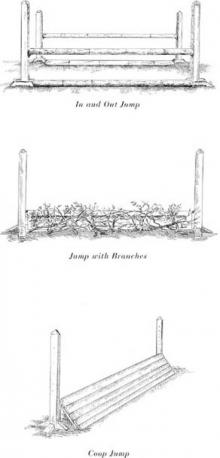 The Georges and the Jewels
The Georges and the Jewels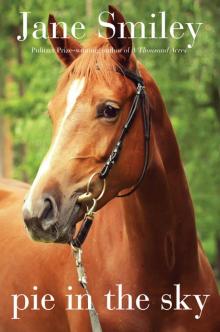 Pie in the Sky: Book Four of the Horses of Oak Valley Ranch
Pie in the Sky: Book Four of the Horses of Oak Valley Ranch Duplicate Keys
Duplicate Keys Charles Dickens
Charles Dickens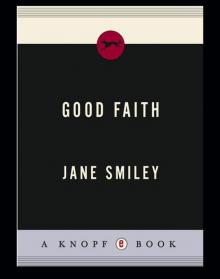 Good Faith
Good Faith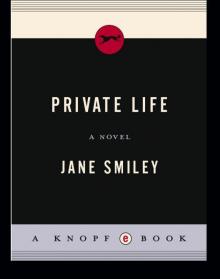 Private Life
Private Life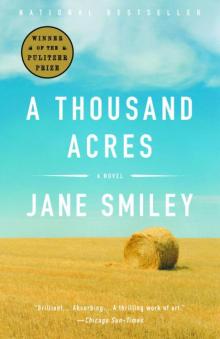 A Thousand Acres: A Novel
A Thousand Acres: A Novel The Greenlanders
The Greenlanders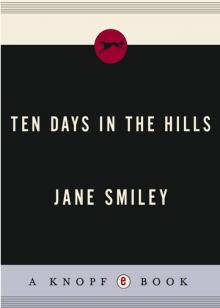 Ten Days in the Hills
Ten Days in the Hills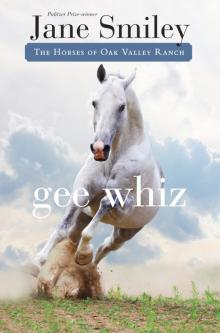 Gee Whiz: Book Five of the Horses of Oak Valley Ranch
Gee Whiz: Book Five of the Horses of Oak Valley Ranch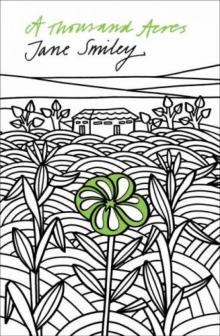 A Thousand Acres
A Thousand Acres The All-True Travels and Adventures of Lidie Newton
The All-True Travels and Adventures of Lidie Newton Ordinary Love and Good Will
Ordinary Love and Good Will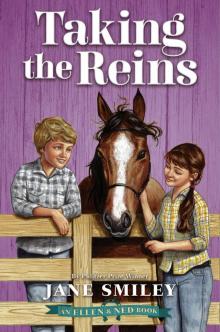 Taking the Reins (An Ellen & Ned Book)
Taking the Reins (An Ellen & Ned Book) The Man Who Invented the Computer
The Man Who Invented the Computer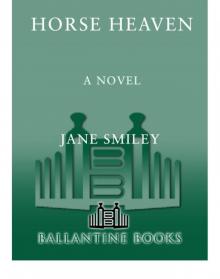 Horse Heaven
Horse Heaven The Age of Grief
The Age of Grief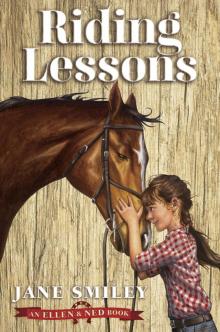 Riding Lessons
Riding Lessons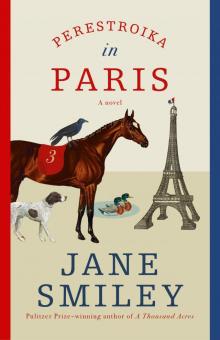 Perestroika in Paris
Perestroika in Paris A Good Horse: Book Two of the Horses of Oak Valley Ranch
A Good Horse: Book Two of the Horses of Oak Valley Ranch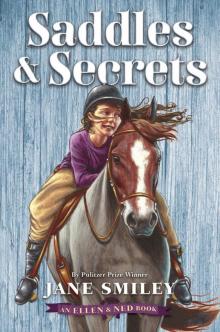 Saddles & Secrets (An Ellen & Ned Book)
Saddles & Secrets (An Ellen & Ned Book)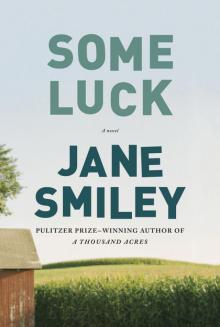 Some Luck: A Novel
Some Luck: A Novel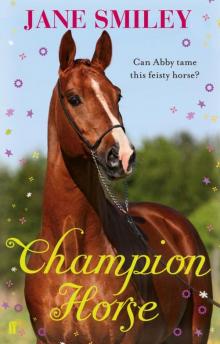 Champion Horse
Champion Horse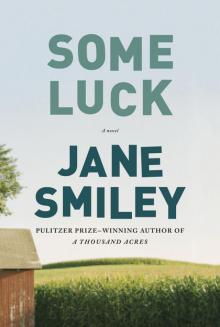 Some Luck
Some Luck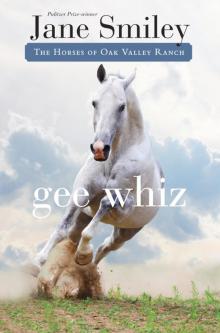 Gee Whiz
Gee Whiz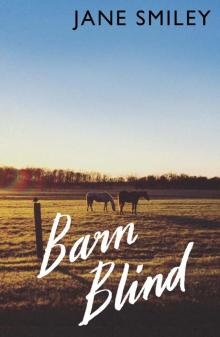 Barn Blind
Barn Blind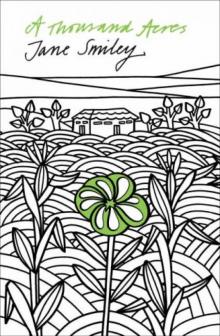 A Thousand Acres (1992 Pulitzer Prize)
A Thousand Acres (1992 Pulitzer Prize)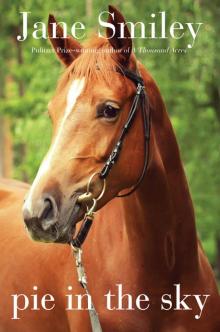 Pie in the Sky
Pie in the Sky True Blue
True Blue A Thousand Acres_A Novel
A Thousand Acres_A Novel A Good Horse
A Good Horse